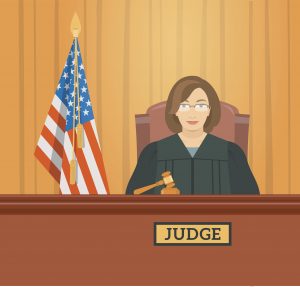#MeToo, Judges, And Bias
We are in part what we've lived, and we can't change that, even when we take the bench.
 Bear with me for a minute:
Bear with me for a minute:
In 1983, the federal appellate judge for whom I clerked had a photograph on her chambers’ wall: She had been one-third of the first-ever, all-female federal appellate panel, and the Los Angeles Times had covered the event. (Here’s a link to the proof: It was Nelson; Fletcher; and Keep, sitting by designation.)
Years later, I was teaching “Complex Litigation” on the adjunct faculty of Case Western Law School, and our casebook included an excerpt from a decision in a sex discrimination class action brought against General Motors that had been heard by that panel (or another all-female Ninth Circuit panel of the same vintage). I told the class about the picture on the wall in one Ninth Circuit judge’s chambers and said something like, “Too bad for GM’s lawyer. You’ve got a sex discrimination class action, and you draw the first all-female federal appellate panel. It’s gonna be a long day.”

Navigating Financial Success by Avoiding Common Pitfalls and Maximizing Firm Performance
I found an anonymous note in my mailbox the next week, from a student who thought it was outrageous for me to suggest that judges’ gender might influence their judicial decisions. I spent part of a class discussing with my law students whether I was biased or whether it was reasonable to think that judges might be influenced by the lives they’d lived. (Women who graduated from law school in the 1950s frequently couldn’t land jobs as lawyers because of their sex. That was lawful. Do you think that personal experience influenced how, 30 years later, they decided sex discrimination claims?)
At about the same time that I was teaching, I found myself sitting in the back of a California state appellate court, waiting for my turn at the lectern to argue a preemption case. My panel was three female judges, all of whom had previously served as prosecutors. This didn’t make too much difference to me, but some guy on the calendar ahead of me was arguing a criminal appeal. You could tell from the argument that his client had been convicted of both murder and mutilation of a corpse. The lawyer was objecting to the years that had been added to the sentence for mutilating the corpse.
Apparently, the defendant was convicted of first murdering a woman and then jamming stones into her dead body. The lawyer made an appeal to common sense: “Why would he possibly jam stones into her after she was dead?”
One of the female former prosecutors grimaced and asked from the bench: “Excuse me — but why would he possibly jam stones inside her while she was still alive?”
Sponsored

Early Adopters Of Legal AI Gaining Competitive Edge In Marketplace

How Generative AI Will Improve Legal Service Delivery


Is The Future Of Law Distributed? Lessons From The Tech Adoption Curve

Legal AI: 3 Steps Law Firms Should Take Now
It’s gonna be a long day.
I don’t think it’s wrong to suggest that people react differently to different circumstances depending on the lives they’ve lived. Women (as a group) react differently than men to claims of sex discrimination. Young African-American men react differently than middle-aged white guys to claims that the police stopped someone without cause. We are in part what we’ve lived, and we can’t change that, even when we take the bench.
Let’s not fight that truth.
In fact, let’s embrace it.
Let’s put people with diverse backgrounds on the bench. Let’s be sure academia includes people of diverse backgrounds publishing articles that might influence the future of the law.
Sponsored

Legal AI: 3 Steps Law Firms Should Take Now

Navigating Financial Success by Avoiding Common Pitfalls and Maximizing Firm Performance
Or maybe I’m wrong, and my anonymous law student was right: Maybe old white guys aren’t influenced at all by the lives they’ve lived, and they approach every case precisely the same way that others would.
Mark Herrmann spent 17 years as a partner at a leading international law firm and is now deputy general counsel at a large international company. He is the author of The Curmudgeon’s Guide to Practicing Law and Inside Straight: Advice About Lawyering, In-House And Out, That Only The Internet Could Provide (affiliate links). You can reach him by email at inhouse@abovethelaw.com.







